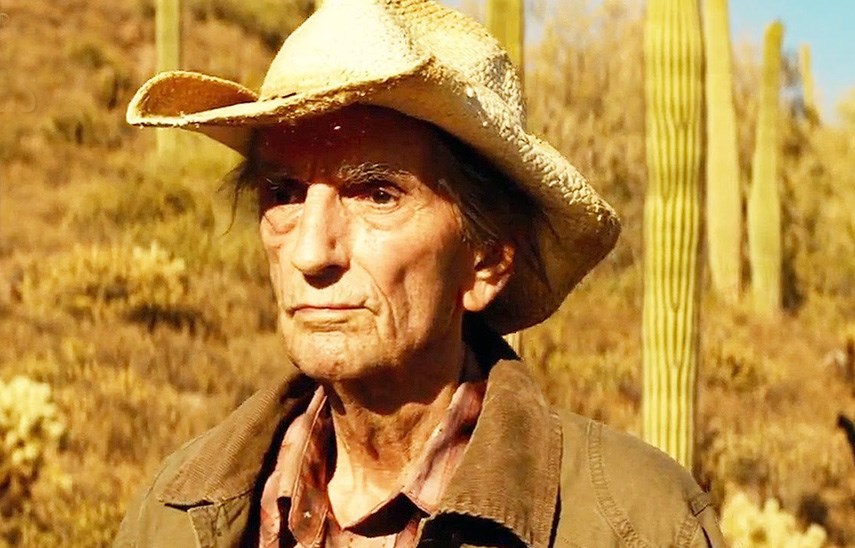Lucky. Directed by John Carroll Lynch. Starring Harry Dean Stanton.
Longtime actor John Carroll Lynch didn’t exactly dip his toe in the water with his directing debut, instead packing his film with respected veterans like David Lynch, Tom Skerritt, Ed Begley Jr, Ron Livingston and Beth Grant, and the late, great Harry Dean Stanton.
Lucky is not so much Harry Dean Stanton’s swan song but his turtle tale: a 100-year-old tortoise named President Roosevelt is seen in the film’s opening making a break for it, navigating the dry hills and cacti of the Arizona desert. It’s what Lucky, Stanton’s 90-year-old curmudgeon, will spend the remainder of the film doing: walking the streets of his parched little town looking for answers to life’s big questions.
Like most old folks, Lucky is a stickler for routine: he does his morning calisthenics while a lit cigarette waits in the ashtray. He gets dressed to go into town, then strips back down to his briefs when he gets home, just in time to watch his game shows. After a fall (and a doctor visit with Ed Begley Jr.) causes him to confront his own mortality there’s a new urgency to these wanderings, a new need for the never-married, somewhat solitary Lucky to make connections.
In age-obsessed Hollywood, you ask an older actor to strip away all vanity and confront his old age at your peril. But Lynch, chatting via phone from the Toronto International Film Festival, says vanity wasn’t an issue for Stanton, who died just weeks before the film was released. “The beauty is he’s played an old codger for a long, long time so I don’t think he was in any danger of being offended,” he says.
Stanton wasn’t searching around, says Lynch: he had been offered large parts in other movies but was essentially retired, doing the odd part for his friend David Lynch or a cameo in Joss Whedon’s The Avengers. “This came about and it was written in such a way that it inspired him… To come out of his tent at 89 and play someone who embraces his own mortality, that’s pretty special.”
The things that attracted Stanton to the script, written by Logan Sparks and Drago Sumonja, were also what appealed to Lynch: “There are a lot of movies about older people in the twilight moment of their lives, it’s a worthwhile meditation. But this one was special to me because (Lucky) didn’t try to fix anything, he didn’t tame a wild bronco, he just changed his perception. That is far truer to me than a tidy ending.”
It was true for Lucky, and for Stanton himself. “Suddenly Lucky starts to think maybe he doesn’t have months and years, but days and weeks. Because it’s true. It’s as true for me as it is for Harry Dean and for the audience.”
Stanton and Begley Jr. were the two actors who came with the project. Timing was tight to cast the memorable supporting characters, so Lynch says they had to follow the one phone call rule: “everyone had to be just one call away”. Lynch had worked with Livingston (The Pretty One) and Grant (she played his wife in Jackie) before; it was Stanton’s suggestion that his longtime friend and collaborator David Lynch come on board.
The iconic director of The Straight Story and Blue Velvet carved out time while shooting 2017’s Twin Peaks to play Howard, the cravat-wearing, bereaved owner of the AWOL President Roosevelt. “I’m going to miss him. He outlived two of my wives,” Howard says earnestly to Lucky. (The line “I miss my friend, his company” takes on new pathos now that Stanton has passed.)
“I knew how warm they were with each other,” Lynch says of Stanton and David Lynch’s relationship. “I was excited to see what he’d bring to this part. (David Lynch) came so prepared and with such a sense of innocence, it’s quite disarming.”
Irresistible too are the small moments in Lynch’s film: Lucky’s brief phone conversations with an unknown friend, that one day goes unanswered; Stanton’s “Volver Volver” performance (“if you don’t get Harry Dean to sing, you’re doing the wrong thing”); and Lucky’s recounting of killing a mockingbird in his youth as “the saddest moment of my whole life… the silence it cast on the world was devastating.”
Harry Dean Stanton, 1926-2017.



